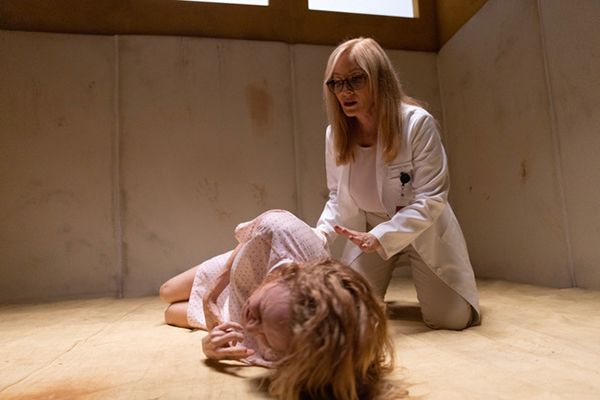 |
| Suitable Flesh Photo: courtesy of Frightfest |
The best adaptation to date of HP Lovecraft’s The Thing On The Doorstep, and a wildly entertaining romp from start to finish, Joe Lynch’s Suitable Flesh screened as part of this year’s Fantasia International Film Festival and is shortly due to screen at Frightfest. It’s a lively, playful and frequently erotic film in the tradition of Re-Animator, which whom it shares star Barbara Crampton, who in this case plays psychiatrist Daniela Upton, who is trying to find out how one of her colleagues, Elizabeth Derby (Heather Graham), has ended up as a patient. Also featuring Judah Lewis as mysterious young patient Asa Waite, who appears to have an unusually extreme case of multiple personality disorder, and Johnathon Schaech as Elizabeth’s husband Edward, it’s a project which Joe is really excited about. When I met him at Fantasia, I asked if the rumour I had heard was true. that this film was adapted from an unfinished project written by Dennis Paoli for Stuart Gordon.
Joe nods. “This was one of the last ones that he was going to be working on. It was kind of getting the gang back together, for him to be able to come back to what we now lovingly call the Miskatonicverse to be able to work with Dennis and Barbara again. As a fan, I hear about this years ago. People knew that it was happening, and then unfortunately, Stuart passed. So honestly, when Barbara sent that script, I thought it was a joke. She knew that I was a huge Stuart fan. When she said ‘Hey, would you like to read this thing that Stuart almost made?’ it was like like dangling a cosmic carrot in front of me. And then she said ‘Would you be interested in directing it?’
“Honestly, it threw me. This was six weeks from when the pandemic started so everybody was in a very weird state. So to have that dangled in front of me was like a cruel joke. But then she was like, ‘No, no. I really want you to direct because before Stuart passed, he and Dennis were talking about other directors who could possibly do it.’ I take it with a grain of salt that Stuart had said that he liked my work and thought I would be right for it. I mean, that's kind of getting like knighted. So I was like, ‘Okay, come on, you can’t bullshit a bullshit artist.’ She was like, ‘No, I think you would really take to the story.’
“Once we read it, my writing partner and I were like, ‘This is cool, but what if instead of it being two male protagonists, it was two female protagonists?’ I've done that before, pitched things with big swing ideas, and usually they walk away or they go like, ‘Let's have lunch,’ and they never call you back. And here, Barbara and Dennis were like, ‘You know, what? Not a bad idea.’ And that was the impetus for how we got things going.”
I tell him that it's so beautifully captured in the Stuart Gordon tradition that it will doubtless leaving people wondering, in light of the subject matter, if he is really Joe Lynch.
“What I tried to do, to be honest, was, I tried to body swap with Stuart from beyond the grave,” he says. “I mean, I've been a fan Stuart's for decades, ever since Re-Animator. He was one of the first filmmakers that I ever I learned about, for better or worse.
“I know that some critics of mine have said ‘I don't think Joe Lynch knows tone.’ No, that's not true. Life isn't a consistent tone. Today could be a comedy; in two hours it could be a tragedy. Tomorrow could be a horror movie, and then the next day is a melodrama and it wins an Oscar. You never know, and Stuart was one of the first directors that challenged my perception of what was horror and what was comedy.
I remember when Re-Animator came out and some critics were calling it ‘the most uproarious, hilarious splatter film in years.’ I'm, like, ‘Uproarious and hilarious? What are you talking about? The poster clearly has a severed head on it.’ But this was at a time when horror was changing, with Return Of The Living Dead and Re-Animator, and Friday The 13th Part IV to a degree. Humour was being injected into our DNA. Re-Animator was one of the first films that taught me that you can still keep your stakes high and have a laugh and take the piss out of something.”
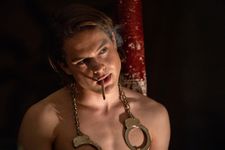 |
| Judah Lewis in Suitable Flesh Photo: courtesy of Frightfest |
I tell him that I think that approach works well in Suitable Flesh, and when we finally get some serious gore, it's still in a comedy vein because it's so over the top.
“Yes. And I felt like it was like a pressure cooker, if you will. If I had come right out of the gate with a lot of the stuff that happens mostly in the third act, if we did it too early, then the audience would be expecting that throughout, and that's not the story that I wanted to tell. If anything – you know, I keep harkening back to sex – but a lot of the first two acts is foreplay. We are hitting first base and then second base, and then we get to third base a little bit. And then by the end, we're hitting a home run. If you read the original Lovecraft story, it is someone telling a story, they're flashing back to their life and what happened, and it needed to have that build. If it didn't, I felt the audience would get bored really quick.”
Speaking of sex, I say, I love the first sex scene in the film because tis a perfect recreation of an Eighties sex scene, with its sax solo, and back then we rarely saw women who looked as if they were actually enjoying themselves, which is important to this story.
“A lot of erotic thrillers use this device and I think it's an effective one,” says Joe. Whenever you have someone – usually played by Michael Douglas – where you have to show that the grass is greener on the other side, and you need to show that someone is not completely satisfied with their partner, you do what is lovingly referred to as a Texas switch, where in the same shot you have the boring guy go down and then the exciting guy come up in the same shot.
“That was the first scene on the first day that we shot, and the only reason why we did that was because the location was only available for the one day and one of the actors had to leave early. Judah Lewis had not turned 21 yet. So they're going, like, ‘This is way out of my wheelhouse, man. I didn't expect that I was going to be doing a sex scene with two other people in the same bed and in the same shot sometimes.’ But it worked out great.
“We needed to have that so that the other sex scenes were a little more exciting. The sexy sax was something that like, I think if you grew up in the Eighties and Nineties that was just part of the soundtrack of sex back then. You would always hear that saxophone. So when Steve Moore and I were talking about the score, even before we showed it to the producers, I'm like ‘What if we bring sexy sax back?’ He's like, ‘Dude!’ because he plays the saxophone too, so he played all of that live. And then we showed it to the producers and almost all of them were like, ‘Wow, I did not expect that.’
“One of them was like ‘Nope, nope, not happening. Don't like it, hate it.’ And it was kind of like 12 Angry Men where I was Henry Fonda and I'm slowly getting them to agree to use the sax. I guarantee you, sexy sax is coming back in a big way. And hopefully this is one of the first movies that uses it.
“I miss all of those details and elements of erotic thrillers from the Eighties and Nineties. There's a great podcast that Karina Longworth has been doing for years called You Must Remember This. She just covered Erotic Eighties and Erotic Nineties, and she was talking about all the movies that my partner and I were thinking of when we were doing the movie. Everything from Fatal Attraction to Basic Instinct and Sliver but also more obscure movies like Last Abduction, even Lost Highway. These movies that used sex in a way that is not exploitative – you know, certain ones were, but back then, that's how we had our sexual exposure in entertainment. Now you just have a sex scene with absolutely no romance, no seduction, it's just a sex scene and you're done, and you're out. That's not how we did it back in the day.”
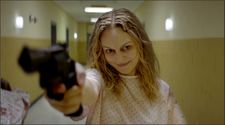 |
| Suitable Flesh Photo: Fantasia International Film Festival |
I mention a documentary which I’ll be reviewing shortly, called We Kill For Love, on just that subject.
“I love that documentary,” he says. “And people will talk about this being a bit of a throwback, but I'm hoping that if anything this throws us forward. I’d love to see sex being used in narrative and character style again, because I've always loved how filmmakers portray sex. They're always different.
“Look at Claire Denis with Trouble Every Day. That is one of the most provocative ways of showing sex that I've ever seen in a film, you know, sex and violence. And then you look at like what Paul Verhoeven was doing with sex all the way back to Spetters. One of my favourite scenes in Spetters is two people having a conversation completely naked in a room and she's stroking his penis, and it was just like, ‘Wow, God, I miss those days.’ You know, when casual sex was not considered too taboo. It's so hard these days – no pun intended – to be able to infuse stories with sex without having it be sterile and homogenised.
“Thankfully, we had actors like Heather and Judah and Jonathan who were absolutely on the same page with me, and two of them have been in a lot of sex scenes. So as long as we made them feel incredibly comfortable, we were on the same page. And we did our best to get the blood flowing, so to speak, in a way that everyone felt comfortable with. I just felt like it was the perfect opportunity to infuse that into the story.”
I note that I was really impressed by Judah generally, because he's very much out of his depth for a young actor a lot of the way through, and he copes incredibly well in a really challenging role – or roles.
“Not taking away from anyone else in the movie, but Asa Waite was arguably the hardest character to tackle and to cast because he's essentially playing three or four different characters,” Joe concurs. “You have to find an actor who can be versatile enough to be able to immediately get the 21-year-old version of that character in that body, then to play an ageless evil entity, then to play a mid-forties, early fifties woman, and another character from there. There was a lot of work that had to be done with that character. I had been a fan of his through The Babysitter. Samara Weaving, who I worked with on Mayhem, kept raving about this kid.
“I met him very briefly at the première, but then when we were casting this, someone brought his name up, and I said ‘I would love to work with him.’ When you offer something to an actor, sometimes they don't want to read for the role for whatever reason. I totally respect that. But he was like, ‘I wouldn't mind just talking to Joe.’ So we had a Zoom call, and what was supposed to be 20 minutes ended up as three hours of us talking about everything from Richard Linklater to Claire Denis to Jean-Marc Vallée, and all these other filmmakers, and then by the end of it, he was like, ‘I'm totally in it.’
“He respected what I was going for. I respected where his process was coming from. For every sex scene, I did extensive storyboards. I'm the worst storyboard person in the world but I'm a good tracer, so what I would do is I would take photos, so it would either be my partner in various positions and I would trace over it going like, ‘Oh, my butt's not nearly that nice.’ I detailed every way that I was going to shoot it, how I was going to shoot and why I was shooting it like that, so everybody knew that ee were taking this very seriously, we were not trying to be gross about it. And when Judah saw that, and even just us starting to work together, we had such a symbiotic relationship that I miss being on set with him, watching that kid work.
“He's a movie star to me. People are used to seeing him from The Babysitter or The Christmas Chronicles. It's one of those roles where people will go ‘That kid grew up!’ you know? He is definitely bringing something to the table that I don't think people are going to expect.”
We also discuss Heather Graham.
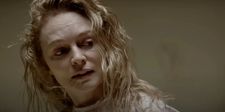 |
| Heather Graham in Suitable Flesh |
“I was a fan of hers from Drugstore Cowboy. Honestly, you know, people talk about Roller Girl from Boogie Nights and the thing that people forget about that role is that there's such a celebration of life and sex in the Seventies in the first half of the film, and her character is roaming around taking pictures, taking her clothes off, you know, there's something very bubbly about her. Then in that scene in the limo that PT Anderson shoots mostly on video where they're trying to capture real life, there’s a look that she gives the camera at one point which broke my heart. I'll never forget that moment being in the theatre going like, ‘Oh, my God, the girl from License To Drive grew up! Holy shit.’
“Ever since then, whenever she would do an indie film, like a darker drama, I was always thrilled to see what she would do. Seeing her in Austin Powers or Lost in Space was cool. I always liked her, her vibe and her energy. And then when her name came up, I’ve got to admit, I was a little sceptical, because I kept thinking about those bubbly roles. Because the thing that you need, again, the same thing that Judah had to go through, so did Heather. She had to play at least three different people.
“One thing that I always liked seeing Heather do was, she's great at grounding the oddball, and I mean that as a high compliment. She somehow can create a character that makes you go ‘She's kind of crazy but I can relate to her too.’ We did a preview of the film in Kansas City a couple months ago, and I forgot to tell the audience that Heather Graham was in it. So the second that she turns around in the padded cell, the audible gasp that the audience had – because she's coming in hot, she’s got the bug eyes, and she's breathing heavy – people were like, ‘Whoa, holy shit!’ It was not what they expected from her.
“We pull back a little bit. Now we're showing her humdrum life and her job, her husband and everything, and I think the audience relaxes a little bit because they're like, ‘Well, you know, she seems pretty chill.’ But then when shit hits the fan, so to speak, she goes cuckoo bananas. You can really tell that Heather was waiting with glee to get into those moments, and that was a sight to behold.”
He talks about how the actors worked together to come up with little tics and gestures which would indicate which personality was in which body.
“As a director, it's a dream come true, because you know that they're walking out the set fully prepared, fully committed. And in an indie film, you don't have time to explore. You have to come in guns blazing and you have to get that or you're not going to get what you need – even just the essentials. So you have to have actors who are really committed. And Heather, Barbara, Johnathon, Judah – man, I got so lucky with this cast. They were incredibly in tune and incredibly in sync with all of the madness that we were trying to capture, but also very aware of like, ‘Okay, we have a finite time here. We can't muck around. They all came in ready to play.”
We discuss aspects of production design and he reveals that he reached out to Sam Raimi to see if he could borrow the Necronomicon, but unfortunately Sam already had a commitment to another film.
“I was like, ‘That's alright, I'm going to make the fauxcronomicon or something.’ I mean, the Necronomicon has been used so much. I just wanted to make sure that it had enough iconography in there to allow the audience to go ‘What if...?’ – you know? I mean, if you look at Evil Dead Rise, that’s a different book than the one from Fede’s movie and that's a different book than the one that's in the Sam Raimi movie, so, to me, there's different permutations of the Necronomicon.
“Even though we shot this in lovely Jackson, Mississippi, we went through a lot of painstaking detail in trying to locate it in the Miskatonicverse. I don't know if you noticed or not, but that’s the same hospital, the same exact one. Funnily enough, that is a hospital that I would drive past every single day on my way to work in Los Angeles. I literally crapped myself when I was like, ‘I've been passing that for years! And I never stood out there and took pictures.’
“So right before production, with my partner Becca, who helped me on the film as well and also helped me edit the film, we just decided to go out there and take a look at it, thinking ‘Alright, when we finish the film, we're going to come back here with a nice fancy HD camera and shoot it, like with the same camera that we shot the rest of the film on. If you don't know those movies, it's no harm no foul, but for the fans, it's a little bit of a secret handshake.
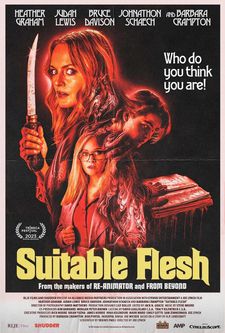 |
| Suitable Flesh poster |
“Lo and behold, we shot the movie and then when we came back they had started construction on the hospital. There's a huge wall in front of it. So the shot that's in the movie is off of my iPhone. But the whole crowd burst into applause when they saw that building. It's the kind of world building that gets me really excited, that you can have a bigger world than just one story.”
I observe that when other filmmakers depict Arkham often they try to make it super spooky. But Lovecraft, in the original story, was talking about ordinary middle class people. It’s partly their lack of familiarity with anything spooky which makes them so vulnerable.
“I'm so glad that you brought up the original short story, he says. “When I read it, the way that Edward Derby is talking about his friends and their life, there were moments that just felt like 1920s suburbia. It could be anywhere. We tried to make sure at least with the colour palette and the houses that we were picking, that it would still feel somewhat New Englandish, even we were shooting in Mississippi, but that was a very deliberate effort. It was not going to be the usual dark, dour Arkham, but show that Arkham has other parts of the neighbourhood as well.”
Something else that always stood out to me about the story, I say, is that it's so complex in terms of sexual attraction and gender. It's really the the only one where Lovecraft goes into that in any detail. There’s a lot of queer subtext in it, which stands out for the time when it was written.
“That’s how we first came up with the idea to switch the genders,” he says. “It wasn't like, “You know what, I'll get audiences in seats, let's do a female version of Lethal Weapon, or one of those movies. We had to have a reason for it. And knowing that, the thing that excited me about this entity is that he's not after world domination. He, it, who knows what gender it is – I think because I have Bruce Davidson in my head, I always think of it as ‘he’ – but, you know, this entity is not going for huge gains. It's just surviving, and it's probably bored, and it’s probably a try-sexual and will try anything at this point.
“To be able to try playing with gender, and bisexuality or pansexuality, you know, even in my own life, I feel like the world is changing in a really great way that allows and accepts this progression in sexuality. One of the things that I'm most proud of in the movie is the fact that this entity, who has been mainly male-skewed for so long, goes into the body of a woman and [during sex] starts saying ‘It's better, it's so much better!’ I love the fact that that's even in there.
“I think there's something to be said about allowing the audience to question their own sexual identity, and hopefully people will be a little more open to being try-sexual, if you will. Hopefully not through body swapping! I think queer cinema has always allowed sexuality to be explored in a very positive and progressive way. You know, gone are the days of Cruising when it was considered, well, sex equals death, or even the era of AIDS where it became a cautionary tale. I think sex can be used in that form but it can also be celebrated. It can also be used in a way that is very erotic and provocative.”
I mention that I was talking to the Adams family the other day about Where The Devil Roams, and they were saying that something that they love about horror is the fact that it can absorb all these other genres.
“I think that's what I've always teetered into,” he says. “I've always stayed in the horror genre in one form or another. Knights Of Badassdom is more of an adventure horror comedy, and Everly is a contained thriller that has horror tropes. People still call Mayhem a horror movie, I never saw it as a horror movie, but again, it has horror tropes. Horror allows you to play with genre but also throw a mirror on society in a way that is much more exciting than just trying to find some kind of melodramatic parable.
“Using something that's more fantastical – whether it's body horror or serial killers or monsters in the closet – there's so many different ways that you can use that thematically that end up being sugar to make the medicine go down. Horror, to me, is a genre that is the best thematic sweetener. Storytellers may go ‘I can probably tell the story, but it might come off really heavy handed. But if I use a monster in it...’ If I take something that is horrifying, like vampirism or fear of death, like with Frankenstein, or transformation like the werewolf, or being invisible like the Invisible Man, when you look, it goes all the way back. If you don't get it, if no harm, no foul, but if you do get it, and you do relate to those characters, there's something that is much more exciting about it than just trying to come up with something that might come off as pretentious in a way.”
He’s not sure what he’ll be working on next, he says, in part because of the complications caused by the writers’ and actors’ strike.
“Honestly, I'm just excited right now. This was a very difficult movie to make for multiple reasons, and it all worked out. I'm blessed that I even got to make the movie and that it's getting the reception it has so far, that people are talking about it at all.”
I’m looking forward to watching it in a double bill with Re-Animator, I tell him, and he grins.
“It goes down like a fucking charm,” he says.





















